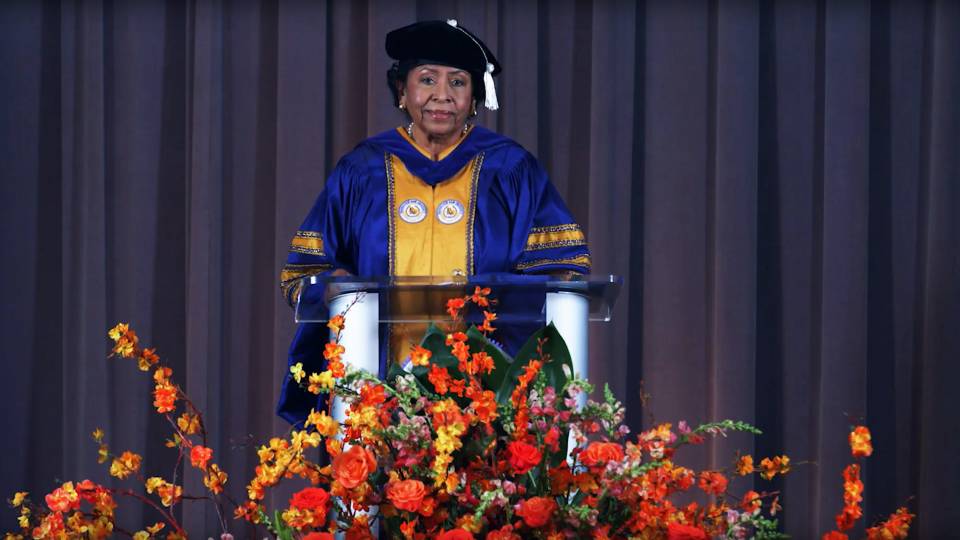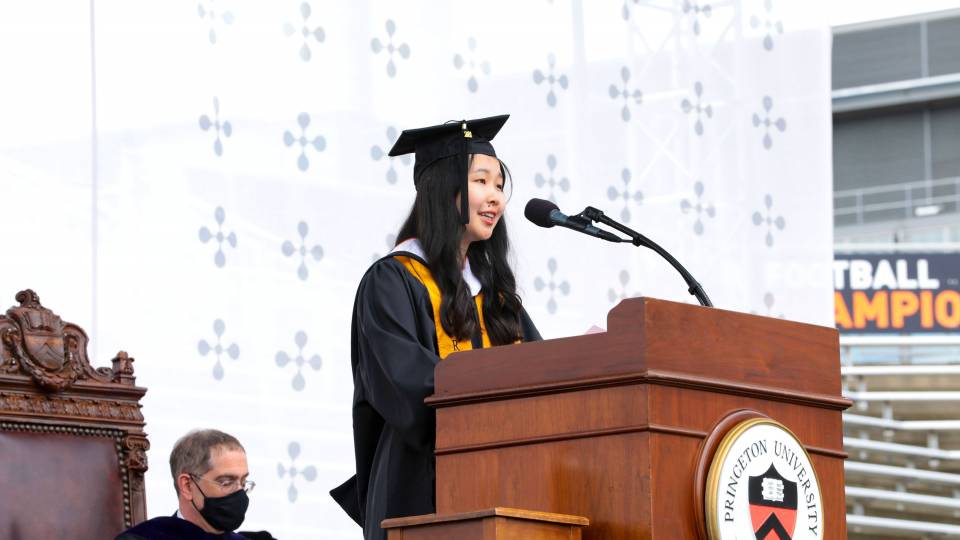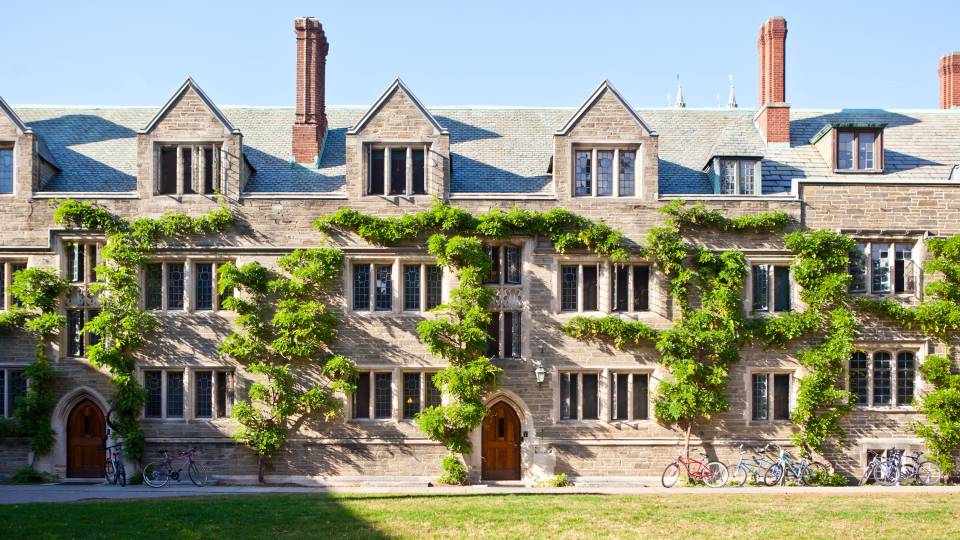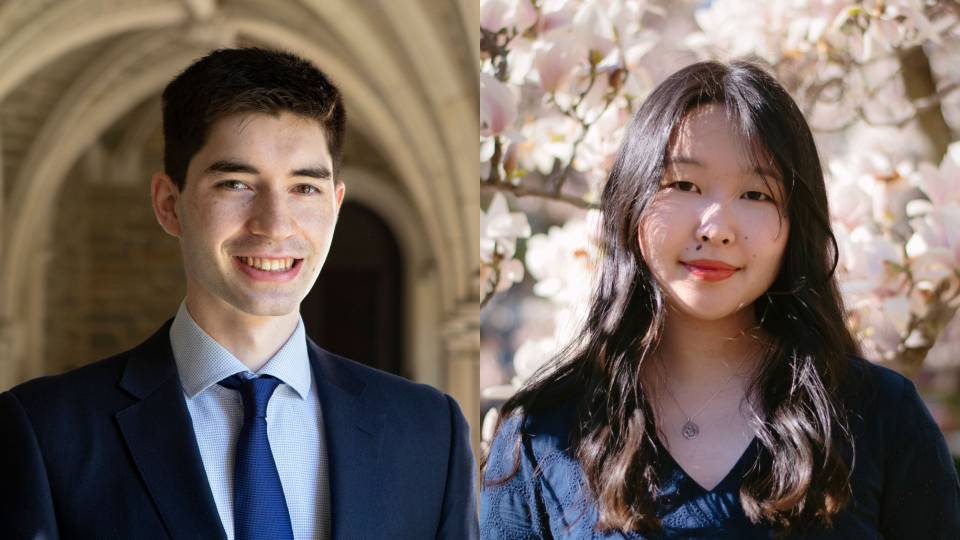Princeton University’s graduate degree recipients and their mentors, family and friends gathered virtually on Monday, May 24, for the Graduate School’s 28th Hooding Ceremony. Many had also gathered in person on Sunday, May 16, for Princeton’s socially distanced Commencement, held for the first time at Princeton Stadium.
Due to the COVID-19 pandemic, this was the second consecutive year in which the Hooding Ceremony was pre-recorded and broadcast online. The ceremony remains available for viewing.

In a pre-recorded message, Cole Crittenden, deputy dean and acting dean of the Graduate School, praised Princeton’s advanced degree recipients for their achievements “under extraordinarily difficult circumstances.”
“Although we cannot hood our advanced degree candidates in person at the current time, we are nonetheless delighted to recognize them individually by name,” Cole Crittenden, deputy dean and acting dean of the Graduate School, told the graduates. “We are also glad to be joined virtually by family and friends of our graduates from around the world, many of whom would not be able to travel here to campus because of ongoing travel restrictions. Our graduates have completed their degrees under extraordinarily difficult circumstances, and their achievements are worthy of our highest praise.”
Hooding of the University’s terminal master’s degree and doctoral degree recipients recognizes their efforts and accomplishments in meeting their degree requirements. It involves the placement of a ceremonial “hood” over the recipient’s head and shoulders, so it drapes down the back of their robe. The hooding is performed by a faculty member — often the student’s adviser.
Hoods distinguish the wearer both by rank and academic discipline. Each hood is bordered by a velvet band in the color assigned to the academic discipline in which the degree is granted: blue for philosophy (as in doctor of philosophy, or Ph.D.); peacock blue for public affairs; gold for engineering; white for arts and letters; brown for architecture; and light brown for finance. The hood lining shows the colors of the degree-granting university — at Princeton, orange with a black chevron.
While degree recipients could not be hooded at an in-person University event this year, many found ways to celebrate with their families, friends and academic mentors.
Ian Lundberg, who earned his Ph.D. in sociology and social policy, said he and his adviser, Brandon Stewart, assistant professor of sociology, had a brief masked and socially distanced meeting along the Delaware and Raritan Canal trail. It was the first time they had seen one another in 18 months.
“After so many meetings by screen, one last in-person meeting was wonderful!” Lundberg said. “But also, this is thankfully not the end. We are planning Zoom meetings about our joint work, which we are both glad will continue even if I am away!”
Lundberg said he was most grateful for Stewart’s attentiveness as an adviser. “Brandon offered countless comments on manuscripts, conference presentations and job market materials,” Lundberg said. “His feedback not only helped me to improve my research output, but also taught me what makes that output good, so that I am more prepared to help others in this task moving forward.”

Nancy Lu, a Ph.D. in chemical and biological engineering, attended Princeton’s outdoor Commencement to celebrate the completion of her degree. She watched the virtual Hooding Ceremony at home with her roommate, a current Princeton graduate student.
Nancy Lu, who earned a doctoral degree in chemical and biological engineering, is the first Ph.D. graduate of the lab of Sujit Datta, assistant professor of chemical and biological engineering.
Datta’s lab held a small, outdoor, socially distanced celebration for Lu after she completed her FPO, or final public oral — the final defense of a candidate’s dissertation. Lu also attended Princeton’s outdoor Commencement. She watched the virtual Hooding from New Brunswick, New Jersey, with her roommate, a current Princeton graduate student.
Datta was a new faculty member when Lu arrived at Princeton, and Lu said she is grateful he took a chance on her. “That experience has really shaped my graduate career,” she said. “Professor Datta has always been very supportive of my endeavors, both in research and in my extracurriculars. He has always nominated me for awards and was always willing to give me the time to develop my professional skills. I was able to attend many different women in STEM conferences that allowed me to explore different career options outside of academia.”
For his part, Datta was grateful for Lu’s contributions to his research team. “She was pivotal in helping to set the lab up and getting tough experiments off the ground; many of our ongoing projects grew out of her efforts,” he said. “Nancy also helped to set an inclusive and nurturing tone for our lab culture that will continue long after she has left Princeton.”
Datta said he was also appreciative that Lu was proactive about providing feedback about his mentoring. “Advising students is one of my absolute favorite aspects of being a professor,” he said. “It is a privilege to work with such talented students to help them grow, both professionally and personally. My ultimate goal is to help them be as happy and successful as possible — however they define success — and realize their full potential.”
He added, “Whatever my students end up doing after they graduate, my hope is that the skills they learn during their Ph.D. will enable them to continue to positively impact society.”

Chris Tokita, a Ph.D. in ecology and evolutionary biology, received a warm send-off from his adviser, Corina Tarnita, associate professor of ecology and evolutionary biology, who held a picnic in his honor in her backyard and gifted him with some mementos of his time at Princeton: a card signed by her lab members, a retro Princeton pennant and a framed stamp of Nassau Hall.
Chris Tokita celebrated the completion of his Ph.D. with a goodbye picnic in the backyard of his adviser, Corina Tarnita, associate professor of ecology and evolutionary biology (EEB). “We shared food and reminisced of pre-pandemic times,” said Tokita, who made a Hawaiian specialty — Spam musubi — for the occasion. “She also gave me a thoughtful keepsake to remember my time at Princeton.”
Tokita said Tarnita’s “high standards and great feedback” have shaped him as a scientist and researcher.
“Corina was always amiable and approachable — willing to discuss not only scientific research, but also sports and Hawaiian cuisine,” Tokita said. “And through my whole graduate school experience, she was as supportive of my scientific endeavors as she was of my other activities, be it graphic design, EEB Scholars or my work with the ADI Diversity Fellows.” (Tokita was named a Diversity Fellow on the Graduate School's Access, Diversity & Inclusion team in 2018 and served three years in that role, being named Head Diversity Fellow in his final year.)
“Corina has been an extremely invested adviser, mentor and collaborator,” he said.
Tarnita praised Tokita for his independence, creativity and self-motivation, as well as his contributions to her lab and to the EEB department.
“A mentor's role is to help students achieve their greatest potential,” Tarnita said. “But in my own experience as a mentor, I discovered that a really, really good student can also push their mentor to learn new things and see old things in new ways. In this regard, Chris has been a spectacular student!”
She continued: “Chris is also wonderful to have around and makes any community that he is part of better. Aside from being the linchpin of my lab for the last five years, he has also contributed enormously to the EEB community, for instance, as one of the main architects of the EEB Scholars program. But that’s Chris — he leaves his mark, and sometimes quite literally. Not many know this, but he is the inspired designer behind both my lab’s and the EEB logos!”
The advanced degree recipients were honored as a group at Commencement and individually during the virtual Hooding Ceremony, which included a roll call of names featuring the graduates’ photos with messages of personal thanks and greetings. Their degrees will be formally conferred on May 25, following the approval of Princeton’s Board of Trustees.
The 457 graduate degrees granted during this academic year were:
- 293 Doctor of Philosophy
- 73 Master in Public Affairs
- 36 Master of Architecture
- 29 Master in Finance
- 13 Master in Public Policy
- 12 Master of Science in Engineering
- 1 Master of Engineering
The Hooding Ceremony also recognized the 2021 recipients of the Graduate Mentoring Awards, presented by Kate Stanton, director of the McGraw Center for Teaching and Learning and associate dean of the college. These awards annually recognize faculty members for their exceptional contributions as mentors to Princeton graduate students.
This year’s winners are Margot Canaday, professor of history and associate chair of the department; Casey Lew-Williams, professor of psychology and director of graduate studies; Meredith Martin, associate professor of English and director of the Center for Digital Humanities; and Howard Stone, the Donald R. Dixon ’69 and Elizabeth W. Dixon Professor of Mechanical and Aerospace Engineering and chair of the department.
Princeton’s President Christopher L. Eisgruber offered his congratulations during the virtual Hooding Ceremony and acknowledged the extraordinary circumstances under which the graduates completed their degrees.

In his remarks, Princeton President Christopher L. Eisgruber congratulated the newly minted Graduate School alumni on having achieved “a rare level of scholarly expertise and distinction.”
“This is a great accomplishment in any circumstances, and you have persevered — and succeeded — in a time filled with unprecedented challenges,” he said. “Your graduate degree is a testament to your talent and commitment as well as a mark of true excellence in scholarship and research. While I wish that we could be together in person today, I’m delighted to be able to offer my congratulations virtually.”
Eisgruber said the degree recipients had attained “a rare level of scholarly expertise and distinction.”
“You now join the ranks of Princeton graduate alumni who have contributed 'in the nation’s service and in the service of humanity' in so many different ways — in the academy and beyond it — through a multitude of different professions,” Eisgruber said. “Your membership in this alumni community is at once an accomplishment and a call to action. I know that each of you will find your own path of service to the nation and to humanity. My colleagues and I look forward to seeing that path unfold in the years ahead.”




![Liza Paudel. [Hindi sentence.] Thank youto my SPIA community for a wonderful two years - we did it!](/sites/default/files/styles/1x_full_2x_half_crop/public/images/2021/05/Liza_Paudel_2.jpg?itok=7mL40mz4)























